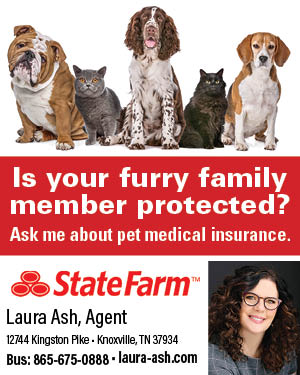Know the dangers of heat stroke for pets
Ask the Vet
Q: : I have been hearing a lot of talk about heat stroke
in dogs lately. It has been pretty hot outside, but how common is it? What do I need to know in case it should happen to my dog?
J.R., Farragut
A: Heat stroke, also known as hyperthermia, unfortunately, still occurs. The most common situation regarding heat stroke involves pets accidentally left inside a hot car in the summer. The interior of a car can heat up quite quickly, estimated at 30 to 40 degrees in one hour. Other situations resulting in heat stroke involve over-exercising in the hot part of the day and/or being out in the sun without shade and water.
Additionally, the first few warm days in the spring can be problematic, especially when dogs are not yet acclimated to the heat. It should be noted that heat stroke also can occur in cats.
Pets most prone to heat stroke are older dogs, dogs with pre-existing heart or lung disease, overweight dogs and brachycephalic dogs (short-nosed breeds like Pugs, Boxers, and Boston Terriers).
Early signs of heat stroke may not always be obvious but can progress rapidly. Affected dogs are distressed, pant heavily, feel hot to the touch and restless. This can progress quickly to excessive salvation, lethargy, ataxia and unconsciousness.
It is important to start treatment at home before heading for emergency treatment. Move your pet indoors with air conditioning and/or a fan if available.
A cool or tepid bath/shower is important, especially getting the ears and paws wet. Do not use cold water, as it can cool them too quickly and shock the system.
Dogs should be cooled until they are 102 to 102.5 degrees Fahrenheit (check with a thermometer if you have one available). Do not use cold, wet towels as they become heavy and make it difficult for pets that are already heavily panting.
Heat stroke, unfortunately, can affect every organ system and can be fatal. Personally, I see fewer cases of heat stroke than I did 30 years ago, and I believe that is due to the media blitz the past few years by local and national veterinary organizations. Thank you for your questions; please spread the word and help keep our pets safe.
If you have questions about your pet, please e-mail Dr. Myers at lenoircityac@gmail.com


